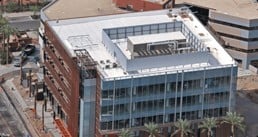![]() Phoenix, Arizona: 602-870-8322
Phoenix, Arizona: 602-870-8322
![]() Houston, Texas: 713-434-7663
Houston, Texas: 713-434-7663

August 19, 2017
Commercial roofs typically have lower or entirely flat slopes and generally cover much larger areas than residential roofs. They also have a more specialized design which require additional external structures like piping, smoke stacks, and air flow systems. The installation of commercial roofing should of course also abide by the building codes in force in your state and local jurisdictions as they set the framework and specify the minimum performance requirements for the commercial roof covering materials to be used, including wind resistance of the membranes, fastening criteria, test standards, fire classification, underlayment requirements, among many other criteria.
Being relatively flatter and having to carry relatively heavier loads, commercial roofs are more prone to springing leaks than residential roofs. To minimize the risk of having to pay for unnecessary repairs, and even untimely replacements, it is important that commercial roofs be regularly inspected, cleaned and maintained. After all, commercial roofs are also often a far more expensive investment than any average residential roof. A regular roof maintenance program will identify signs of trouble before bigger issues arise, ultimately resulting in more savings in your pocket.
Aside from leaks due to tears or punctures on the roof membranes, pools of stagnant water or piles of leaves and other debris can be causes of future roofing problems. A regular roof maintenance program will help you keep your roof free of debris and help you get rid of the ponding water before they affect the roof cover and create even more leaks. If as is the case with most commercial roofs, you have skylights and one or some of them have been left unsecured or not well-sealed around the framing edge, leaks can penetrate and dislodge them from the roof cover. In turn, once dislodged, rain and debris can enter your building through the skylights during storms, high winds and other extreme weather disturbances.
A regular roof inspection plan can ensure that all skylights are properly secured and well-sealed at all times. As is the case with services in other industries, some preventative action now will help stop potential problems from happening in the future.
Unlike in the case for most typical residential roofs, the installation, repair and regular inspection and maintenance on all commercial roofs should best be left to an established, licensed or bonded professional roofing contractor duly accredited to do business in the state. Because of the size and complexity of the job, working on commercial roofs require specialized training, including federally-mandated safety training.